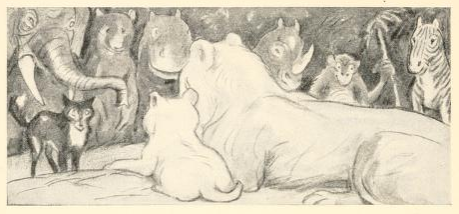εἷς ~ ἑνός (adj. masc.): one, single
πλέον ~ πλέονος (adj. neut.): more, greater
ἀφανής ~ ἀφανοῦς (adj. masc.): invisible, secret
πιστός ~ πιστοῦ (adj. masc.): trustworthy
προτέρα ~ προτέρας (adj. fem.): earlier, first
Ἕνα ἀλλὰ λέοντα.
Πλέον ἥμισυ παντός.
Χρυσὸς ὁ ἀφανὴς τύραννος.
Φίλος πιστὸς σκέπη κραταιά.
Προτέρα πάντων ἔκτισται σοφία.
And now, some commentary:
Ἕνα ἀλλὰ λέοντα.
One, but a lion.
This is the punchline to an Aesop's fable: when the fox rebukes the lioness for having only one cub, this is the lioness's reply. That's why the words are in the accusative: "(I have only) one (cub), but (he is) a lion." In other words, all the offspring of the fox could never equal a single lion. Here are some English versions of the Aesop's fable.
Πλέον ἥμισυ παντός.
The half is greater than the whole.
The Greek saying was used to refer to someone who would risk losing what they have in order to gain something more; compare the English saying, "A bird in the hand is worth two in the bush." The adjective πλέον is comparative, so it takes a genitive complement: παντός. From the root in Greek ἥμισυ we get the hemi- words in English like hemisphere.
Χρυσὸς ὁ ἀφανὴς τύραννος.
Gold is the invisible tyrant.
The adjective ἀφανὴς is an alpha-privative: ἀ-φανὴς, in-visible. From Greek τύραννος, we get English "tyrant." The etymology of the Greek word is obscure; here are some possible etymologies.
Φίλος πιστὸς σκέπη κραταιά.
A faithful friend is a strong shield.
The words come from the Biblical "wisdom book" known as Sirach or Ecclesiasticus. Compare yesterday's proverb: Φίλος πιστὸς φάρμακον ζωῆς. The adjective πιστὸς is derived from the verb πείθω, which is cognate with the Latin verb fido, and so ultimately is related to English "faith."
Προτέρα πάντων ἔκτισται σοφία.
Before all things, wisdom was created.
The words also come from the Biblical book of Sirach. The verb ἔκτισται is a perfect passive form. From Greek σοφία we get the name Sophia, and for more about the Biblical tradition of Wisdom, see Wikipedia: Holy Wisdom. You can see the neuter form of προτέρα in the phrase hysteron proteron, a rhetorical device; find out more at Wikipedia: ὕστερον πρότερον. And here's a random proverb too:

No comments:
Post a Comment